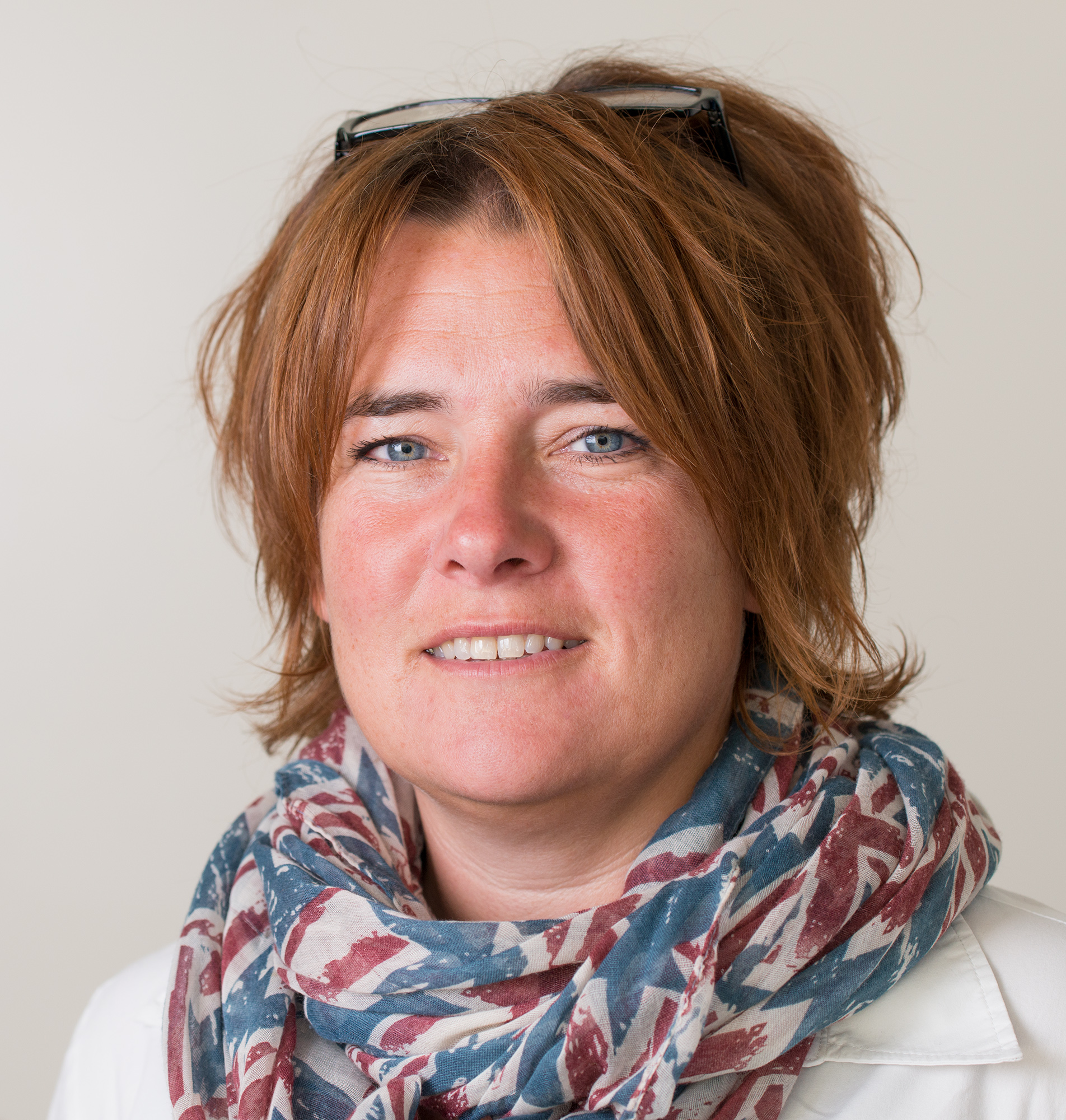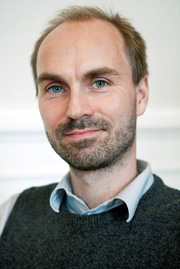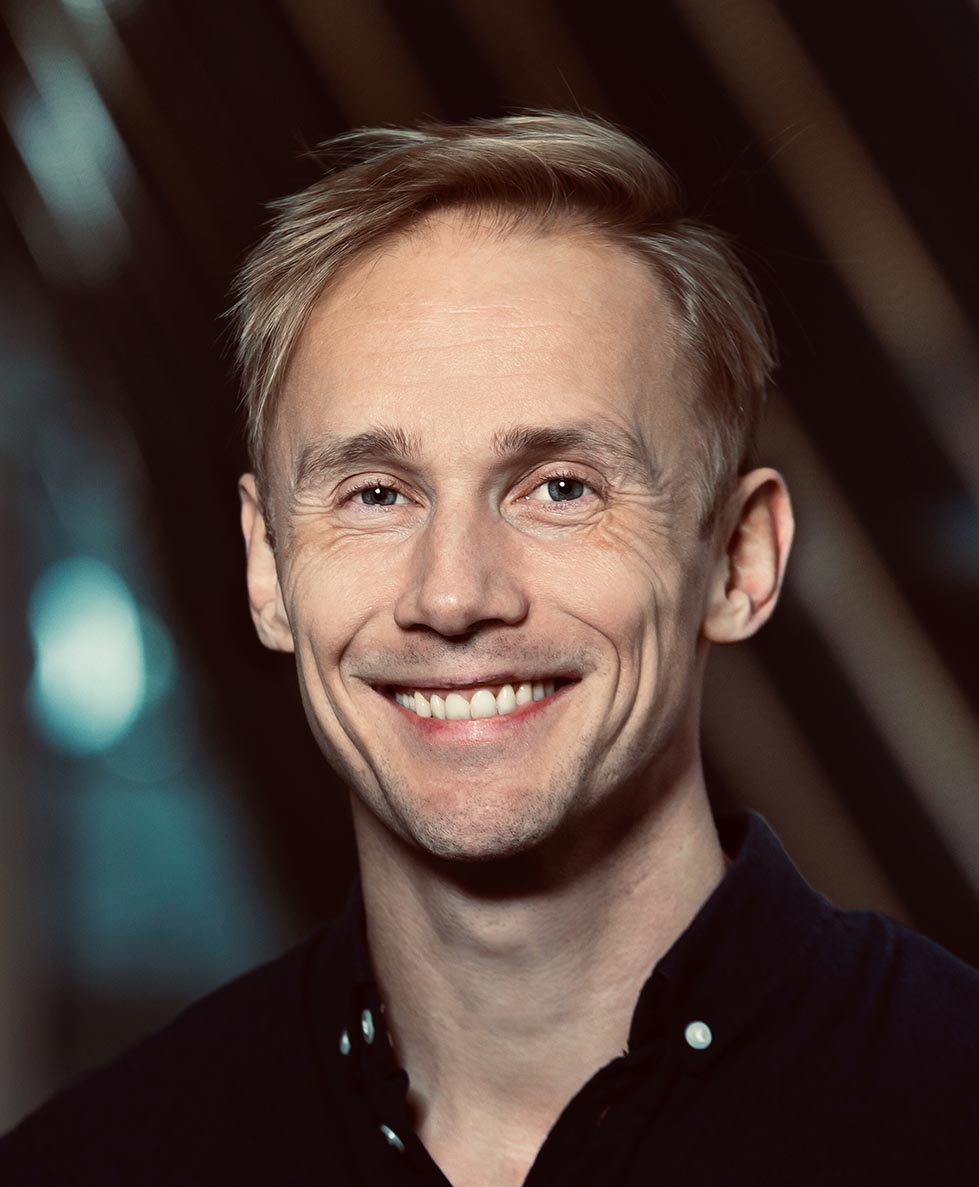
SBiNLab: Structural Biology and NMR Laboratory
The research and teaching programs of the laboratory are focussed on the structural biology of proteins. Structural Biology of proteins is a discipline of science aiming towards understanding the correlations between molecular structure and function of proteins, which are the vital engines of the biological cell factory.
A wide selection of techniques are implemented at the laboratory including NMR spectroscopy, optical spectroscopy, protein engineering, bioinformatics and molecular biology.
 |
Birthe B. Kragelund, Professor KU profile page | Personal web site By application of NMR spectroscopy, x-ray crystallography, protein engineering and biophysical techniques we seek to map mechanisms of interactions involved in i.e. receptor activation, cell division, signal transduction, immune activation and protein degradation. |
 |
Kaare Teilum, Professor KU profile page | Personal web site Slow conformational changes are of key importance to enzyme function. We use NMR spectroscopy, X-ray diffraction and computational methods to characterize, interpret and rationalize the effects of point mutations on the flexibility, stability and catalysis of enzymes in general. |
 |
Kresten Lindorff-Larsen, Professor KU profile page | Personal web site The primary tools used in our research are computational methods that we use to study the structure and dynamics of proteins. A particular focus is methods that combine experimental data from NMR spectroscopy with molecular simulations. In one set of studies we combine experiments and simulations to provide a detailed structural interpretation of the experimental data. In another methods to predict what mutations are likely to occur and give rise to drug resistance and what possible mutations giving rise to drug resistance would actually render the enzyme inactive. |
 |
Pëtur O. Heiðarsson, Professor KU profile page | Personal web site Our research focuses on transcription factors, dynamic protein molecules that regulate genomic architecture and transcription of genes. We study how the structure and dynamics of transcription factors allow them to navigate and modulate the genome, and how they enable cell fate decisions to be made. We are particularly invested in deciphering the activity of pioneer transcription factors involved in cell reprogramming and applying rational design approaches to harness these factors for efficient cell fate control We use an integrative approach by combining single-molecule and ensemble techniques, biochemistry, and computer simulations through collaborations, to obtain a microscopic molecular view of transcription factor function. |
PhD projects
We offer a range of different PhD projects, often in collaboration with international academic coworkers or industrial domestic partners. As a phd student you are accepted into the PhdDschool at the Faculty of Science and become part of the PhD program in Protein Science. Please apply directly with the individual principal investigators.
We are also organizing PhD Summer Schools in Protein Science at regular intervals offering lectures by prominent international speakers and seminars.
MSc and BSc Student Projects
The group has an extensive collaboration around techniques and subjects. When working in the group you will be confronted with the following techniques either directly in your own project or through the person on the bench next to you. The major techniques used include:
- Protein expression and purification
- Biophysical techniques (protein stability and folding)
- Molecular biology (cloning, PCR, mutagenesis)
- Analytical techniques (UV-VIS and fluorescence spectroscopy, RP-HPLC)
- Molecular dynamics (MD) simulations
- Computational methods integrating MD simulations with data from experiments
- Nuclear Magnetic Resonance Spectroscopy (NMR)
The laboratory houses the departmental NMR facility equipped with state of the art equipment including three NMR magnets operating at 600, 750 and 800 MHz set up for protein NMR.
SBiNLab has a strong focus on education and welcome new students in the lab. We generally have about 8 masters and 8 bachelor students in our laboratories. All students participate in the weekly SBiNLab seminars, where they give at least one short presentation while working in the lab. If you want to hear more about working in the SBiNLab from a student perspective you are welcome to contact one of the students in the staff list.
Courses
SBiNLab offers teaching in the B.Sc. and M.Sc. and Ph.D. courses on protein and cell-biology related subjects. You can read more about the courses taught by the members of the section in the list of courses taught by the Section for Biomolecular Sciences.
In SBiNLab we have a large number of projects. Find examples of our projects below.
SBiNLab has state-of-the-art laboratories equipped for liquid protein NMR spectroscopy which is accessible to researchers from all fields via the cOpenNMR facility (https://www1.bio.ku.dk/copennmr). Additionally we use a wide range of other biophysical and biochemical methods. If you are interested in accessing the equipment or have samples for analysis you are welcome on either a pay-for-service, pay-for-access or collaborative basis. Please contact the manager of the cOpenNMR facility (andreas.prestel@bio.ku.dk) or the section head Kaare Teilum (kaare.teilum@bio.ku.dk) for inquiries.
Services of particular relevance to industrial or academic collaborators:
- 600, 750 and 2x800 MHz NMR spectrometers equipped for liquid protein spectroscopy
- Protein expression facilities
- JASCO J-810 CD spectrometer
- Bruker MALDI-TOF MS spectrometer
- Zetasizer SLS and DLS instrument
As part of the research in SBiNLab a number of small applications have been developed. Please find the programs in the list below (click on the titles to access the scripts).
Random coil chemical shifts for intrinsically disordered proteins I
The script automatically calculates the sequence-corrected random coil chemical shifts of a protein, while taking the effects of pH and temperature into consideration.
Random coil chemical shifts for intrinsically disordered proteins II
This script will calculate the chemical shifts for any protein sequence also including phosphorylations.
IDDomainSpotter
IDDomainSpotter is a sequence-based approach to assess and visualize domain organisation in long intrinsically disordered proteins based on compositional biases.
PYDA is a web-based Dashboard tool to easily visualise and fit experimental data from protein purification and spectroscopy. PYDA was developed for the research integrated course “Protein research Lab - Intrinsically Disordered Proteins.
Libraries
Københavns Universitetsbibliotek
Danmarks Tekniske Videncenter & Bibliotek
Danmarks Veterinær- og Jorbrugsbibliotek
On-line journals
Kemibrug
Scientific resources
ExPASy
Protein Data Bank
BioMagResBank
NMR Pulse Sequence Library at CRC
ISI Web of Knowledge
Phylogenetic motif MINER
NCBI
Medline
Entrez
Blast
Companies
Instruments
Chemicals
Cambridge Isotope Laboratories
Sigma-Aldrich
Silantes
Spectra Stable Isotopes
Merck
Molecular Probes
Molecular biology
Amersham Pharmacia Biotech
Invitrogen
Novagen
Promega
Stratagene
Societies and meetings
Events at the Department of Biology
The Danish Society for Biochemistry and Molecular Biology
We are always happy to receive applications from potential postdocs, PhD, Masters, and Bachelor students, and we welcome applications from both Denmark and abroad. If you are interested in joining the lab or just want to know more about our work, find the relevant scientific staff member and contact us by phone or email – or stop by one of the labs in the Biocenter (see map here).
See currently open positions here.
Postdoc positions
Open positions are advertised broadly in the relevant media.
In addition, chances of obtaining postdoc grants are quite good when applying with Danish and/or international foundations. If you are interested in applying contact the scientific staff member that you would like to work.
PhD projects
The University of Copenhagen offers studentships for students holding a Danish or foreign Masters degree. In addition, possibilities exist to apply for funding from private foundations. Phd students are accepted into the PhD school at the Faculty of Science and become part of the PhD program in Protein Science.
Masters and Bachelor students projects
We always offer both Masters and Bachelor projects within our different areas of research. For more information and a list of current projects in the University of Copenhagen project database here.
For all types of positions, please contact the staff to discuss specific projects.
Contact
Structural Biology and NMR Laboratory (SBiNLab)
Section for Biomolecular Sciences
Ole Maaløes Vej 5
DK-2200 Copenhagen N
GROUP MEMBERS
Prof. Birthe B. Kragelund
Prof. Kaare Teilum
Prof. Kresten Lindorff-Larsen
Assoc. prof. Pétur O. Heiðarsson
